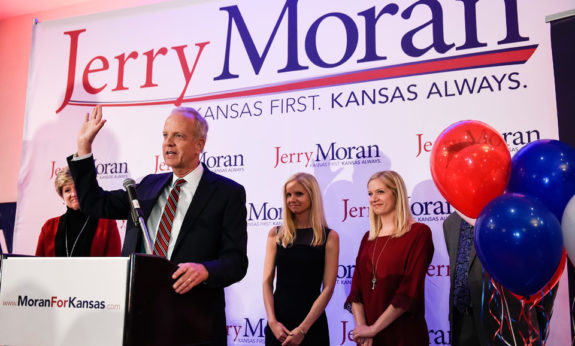
Senator Jerry Moran, Republican of Kansas, introduced his Cuba Trade Act on February 28, 2017. He had also proposed it two years earlier, and both times companion bills were introduced in the House. His bill, which according to its official legislative summary “repeals or amends current laws restricting trade with Cuba,” would end the U.S. trade embargo, widely viewed by Cuban solidarity activists as a blockade.
The Cuba Trade Act attracted two co-sponsors in 2015 and died in committee. Prospects this time are no better. In the wake of President Obama’s 2014 opening to Cuba, legislators seeking merely to modify the blockade have proposed legislation or added amendments to unrelated bills. Those proposals also failed.
The issue here is how Congress might actually be pushed into ending the blockade. The question is relevant because the Helms-Burton Law of 1996 stipulates that only Congress may do that.
The blockade failed a fifty-year trial of using it to provoke regime change. That idea, articulated by former President Obama, is widely accepted. Even the very conservative Cato Institute suggests that, “the economic embargo has completely failed.” And most Americans no longer favor the blockade.
The most recent opinion survey from the Pew Research Center indicated that 73 percent of U.S. adults want to end the blockade. Among Republicans and Republican-leaning independents, 62 percent favor terminating the embargo, while among Democrats and Democratic-leaning voters, the number is 84 percent. Florida International University reported that support for the blockade from Cuban emigres and their families in Florida declined from “84 percent in the 1990s to just 37 percent” in 2016.
Recent examples of U.S.-Cuban collaborative planning speak to the possibility of decent relations. Discussions have covered narcotics trafficking, human smuggling, border security, disease control, environmental protection, and U.S. air services to the island. Talks continue on bilateral claims for damages incurred during decades of hostility.
Senator Moran’s mainstream credentials include membership in the Congressional Sportsmen’s Caucus that recognizes him as “a leading advocate…for protecting the special way of life in Kansas – including the state’s rich tradition of hunting and fishing.” He argues for a flat tax and to get rid of the IRS.
Moran helped to establish the U.S. Agricultural Coalition for Cuba which seeks “improvement of agricultural trade between the U.S. and Cuba [as] the foundation for building successful and enduring relations between both countries.” Member organizations include: the Illinois Soybean Growers, the U.S. Wheat Association, the Farm Bureau, the USA Rice Federation, and the National Chicken Council.

Sharing Moran’s cause, the Alabama legislature in March 2016, unanimously approved a resolution calling for the blockade’s end. A few months earlier, the governors of nine states signed a statement to that effect. Cuba’s socialist orientation remains, but U.S. capitalists ought to be encouraged by provisions made for private control of land and by emerging signs of a market-based economy and entrepreneurialism. According to Foreign Affairs, there has been a sharp drop in the number of long-term political prisoners in Cuba, a fact which further weakens U.S. political complaints.
That same Foreign Affairs review of prospects for removing the blockade attributes blame to six Florida senators and representatives who “have maintained a chokehold on all issues related to Cuba.” Why are these six more influential than the current momentum towards normalization of U.S.-Cuban relations?
Disregard for the overwhelming logic of ending the blockade may in fact signal that no one is listening; Cuba may not matter much for most U.S. politicians and the public. If true, that’s bad news for Senator Moran, because he needs friends. The ones he has, agricultural and business leaders joined by a few politicians, aren’t enough.
A distracted public remains unmoved by forthright, sustained protest against U.S. policies toward Cuba precisely because such protest simply doesn’t exist. If a center-left opposition in the United States had melded the issue of decent U.S. relations with Cuba into an overall program for change, things might be different. Now, activists pushing the single issue of Cuba remain largely outside the U.S. political process.
Seeking solutions, the authors of a recent review of anti-blockade efforts insist that “the voices of grassroots activists will be evermore necessary to demand a just U.S. Cuba policy.” They cite resolutions on ending the blockade approved by municipal governments near San Francisco and in Brookline, Massachusetts, a Boston suburb.
In Europe, Canada, and Australia, unions flourish and labor-oriented political parties vie for power. These are hospitable settings for inserting the Cuba issue into an extended political agenda. In places like Great Britain, labor unions are champions of solidarity with Cuba. And Parliament pays attention.
The persistence of the U.S. blockade relates directly to an absence here of a political party for the working class. That’s a big handicap for Cuba solidarity activists who want to prod progressives in unions and elsewhere into protesting the blockade. Yet the effort is necessary, although some leftists will beg off. They need a course correction: bias as to revolutionary Cuba’s fatal infection from exposure to its former Soviet ally immobilizes too many of them.
Anticipating victory for the progressive candidate Lenín Moreno in Ecuador’s presidential elections set for April 2, New York history professor Greg Grandin, for instance, noted in The Nation that, “Latin America was [recently] governed by representatives of each of its historic left-wing traditions…” representing “[n]early the full left spectrum especially if we were to be generous and include Cuban Stalinists.”
Stalin had already been dead for five years when Cuba’s revolutionary government gained power 58 years ago.










